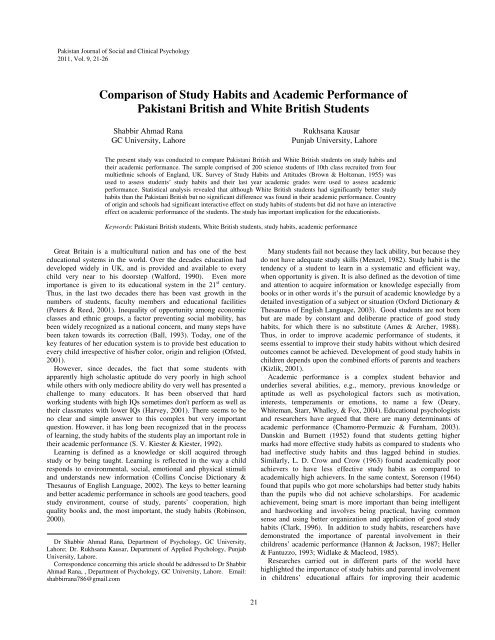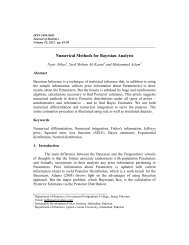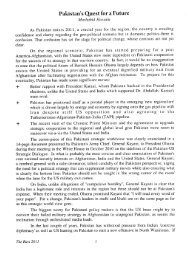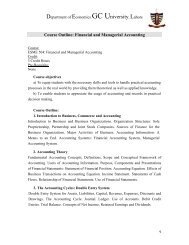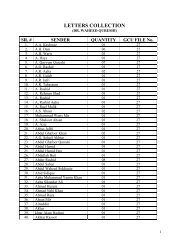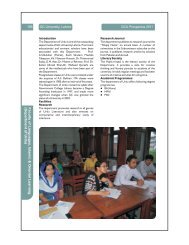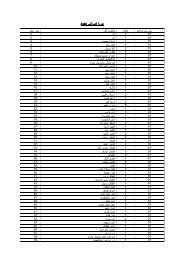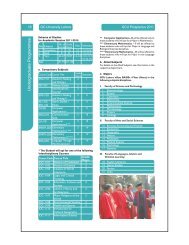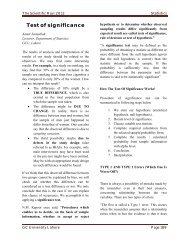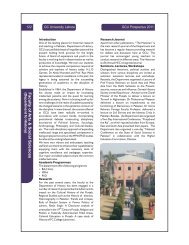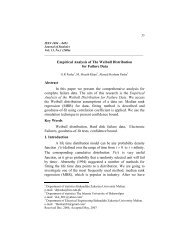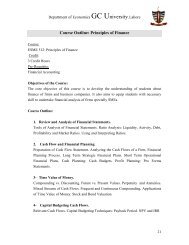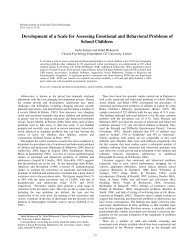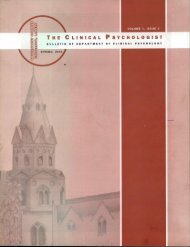Comparison of Study Habits and Academic Performance of Pakistani
Comparison of Study Habits and Academic Performance of Pakistani
Comparison of Study Habits and Academic Performance of Pakistani
Create successful ePaper yourself
Turn your PDF publications into a flip-book with our unique Google optimized e-Paper software.
Pakistan Journal <strong>of</strong> Social <strong>and</strong> Clinical Psychology<br />
2011, Vol. 9, 21-26<br />
<strong>Comparison</strong> <strong>of</strong> <strong>Study</strong> <strong>Habits</strong> <strong>and</strong> <strong>Academic</strong> <strong>Performance</strong> <strong>of</strong><br />
<strong>Pakistani</strong> British <strong>and</strong> White British Students<br />
Shabbir Ahmad Rana<br />
GC University, Lahore<br />
Rukhsana Kausar<br />
Punjab University, Lahore<br />
The present study was conducted to compare <strong>Pakistani</strong> British <strong>and</strong> White British students on study habits <strong>and</strong><br />
their academic performance. The sample comprised <strong>of</strong> 200 science students <strong>of</strong> 10th class recruited from four<br />
multiethnic schools <strong>of</strong> Engl<strong>and</strong>, UK. Survey <strong>of</strong> <strong>Study</strong> <strong>Habits</strong> <strong>and</strong> Attitudes (Brown & Holtzman, 1955) was<br />
used to assess students’ study habits <strong>and</strong> their last year academic grades were used to assess academic<br />
performance. Statistical analysis revealed that although White British students had significantly better study<br />
habits than the <strong>Pakistani</strong> British but no significant difference was found in their academic performance. Country<br />
<strong>of</strong> origin <strong>and</strong> schools had significant interactive effect on study habits <strong>of</strong> students but did not have an interactive<br />
effect on academic performance <strong>of</strong> the students. The study has important implication for the educationists.<br />
Keywords: <strong>Pakistani</strong> British students, White British students, study habits, academic performance<br />
Great Britain is a multicultural nation <strong>and</strong> has one <strong>of</strong> the best<br />
educational systems in the world. Over the decades education had<br />
developed widely in UK, <strong>and</strong> is provided <strong>and</strong> available to every<br />
child very near to his doorstep (Walford, 1990). Even more<br />
importance is given to its educational system in the 21 st century.<br />
Thus, in the last two decades there has been vast growth in the<br />
numbers <strong>of</strong> students, faculty members <strong>and</strong> educational facilities<br />
(Peters & Reed, 2001). Inequality <strong>of</strong> opportunity among economic<br />
classes <strong>and</strong> ethnic groups, a factor preventing social mobility, has<br />
been widely recognized as a national concern, <strong>and</strong> many steps have<br />
been taken towards its correction (Ball, 1993). Today, one <strong>of</strong> the<br />
key features <strong>of</strong> her education system is to provide best education to<br />
every child irrespective <strong>of</strong> his/her color, origin <strong>and</strong> religion (Ofsted,<br />
2001).<br />
However, since decades, the fact that some students with<br />
apparently high scholastic aptitude do very poorly in high school<br />
while others with only mediocre ability do very well has presented a<br />
challenge to many educators. It has been observed that hard<br />
working students with high IQs sometimes don't perform as well as<br />
their classmates with lower IQs (Harvey, 2001). There seems to be<br />
no clear <strong>and</strong> simple answer to this complex but very important<br />
question. However, it has long been recognized that in the process<br />
<strong>of</strong> learning, the study habits <strong>of</strong> the students play an important role in<br />
their academic performance (S. V. Kiester & Kiester, 1992).<br />
Learning is defined as a knowledge or skill acquired through<br />
study or by being taught. Learning is reflected in the way a child<br />
responds to environmental, social, emotional <strong>and</strong> physical stimuli<br />
<strong>and</strong> underst<strong>and</strong>s new information (Collins Concise Dictionary &<br />
Thesaurus <strong>of</strong> English Language, 2002). The keys to better learning<br />
<strong>and</strong> better academic performance in schools are good teachers, good<br />
study environment, course <strong>of</strong> study, parents’ cooperation, high<br />
quality books <strong>and</strong>, the most important, the study habits (Robinson,<br />
2000).<br />
Dr Shabbir Ahmad Rana, Department <strong>of</strong> Psychology, GC University,<br />
Lahore; Dr. Rukhsana Kausar, Department <strong>of</strong> Applied Psychology, Punjab<br />
University, Lahore.<br />
Correspondence concerning this article should be addressed to Dr Shabbir<br />
Ahmad Rana, , Department <strong>of</strong> Psychology, GC University, Lahore. Email:<br />
shabbirrana786@gmail.com<br />
Many students fail not because they lack ability, but because they<br />
do not have adequate study skills (Menzel, 1982). <strong>Study</strong> habit is the<br />
tendency <strong>of</strong> a student to learn in a systematic <strong>and</strong> efficient way,<br />
when opportunity is given. It is also defined as the devotion <strong>of</strong> time<br />
<strong>and</strong> attention to acquire information or knowledge especially from<br />
books or in other words it’s the pursuit <strong>of</strong> academic knowledge by a<br />
detailed investigation <strong>of</strong> a subject or situation (Oxford Dictionary &<br />
Thesaurus <strong>of</strong> English Language, 2003). Good students are not born<br />
but are made by constant <strong>and</strong> deliberate practice <strong>of</strong> good study<br />
habits, for which there is no substitute (Ames & Archer, 1988).<br />
Thus, in order to improve academic performance <strong>of</strong> students, it<br />
seems essential to improve their study habits without which desired<br />
outcomes cannot be achieved. Development <strong>of</strong> good study habits in<br />
children depends upon the combined efforts <strong>of</strong> parents <strong>and</strong> teachers<br />
(Kizlik, 2001).<br />
<strong>Academic</strong> performance is a complex student behavior <strong>and</strong><br />
underlies several abilities, e.g., memory, previous knowledge or<br />
aptitude as well as psychological factors such as motivation,<br />
interests, temperaments or emotions, to name a few (Deary,<br />
Whiteman, Starr, Whalley, & Fox, 2004). Educational psychologists<br />
<strong>and</strong> researchers have argued that there are many determinants <strong>of</strong><br />
academic performance (Chamorro-Permuzic & Furnham, 2003).<br />
Danskin <strong>and</strong> Burnett (1952) found that students getting higher<br />
marks had more effective study habits as compared to students who<br />
had ineffective study habits <strong>and</strong> thus lagged behind in studies.<br />
Similarly, L. D. Crow <strong>and</strong> Crow (1963) found academically poor<br />
achievers to have less effective study habits as compared to<br />
academically high achievers. In the same context, Sorenson (1964)<br />
found that pupils who got more scholarships had better study habits<br />
than the pupils who did not achieve scholarships. For academic<br />
achievement, being smart is more important than being intelligent<br />
<strong>and</strong> hardworking <strong>and</strong> involves being practical, having common<br />
sense <strong>and</strong> using better organization <strong>and</strong> application <strong>of</strong> good study<br />
habits (Clark, 1996). In addition to study habits, researchers have<br />
demonstrated the importance <strong>of</strong> parental involvement in their<br />
childrens’ academic performance (Hannon & Jackson, 1987; Heller<br />
& Fantuzzo, 1993; Widlake & Macleod, 1985).<br />
Researches carried out in different parts <strong>of</strong> the world have<br />
highlighted the importance <strong>of</strong> study habits <strong>and</strong> parental involvement<br />
in childrens’ educational affairs for improving their academic<br />
21
RANA & KAUSAR 22<br />
performance (Coleman, Collinge, & Tabin, 1993; Ramsay, Harold,<br />
& Hawk, 1990; Toomey, 1993). Robinson (2000) found that certain<br />
bad study habits result in poor academic performance whereas<br />
certain good study habits result in high academic performance.<br />
Creemers <strong>and</strong> Reynold (2000), on the basis <strong>of</strong> data <strong>of</strong> National<br />
Assessment <strong>of</strong> Educational Progress, demonstrated a positive<br />
relationship between good study habits <strong>and</strong> academic performance<br />
<strong>of</strong> 8 th <strong>and</strong> 9 th Grade students. Similarly, Gilbert <strong>and</strong> Rollick (1996)<br />
suggested good study habits to significantly enhance academic<br />
performance <strong>of</strong> the pupils.<br />
According to Troyna (1981), the issue <strong>of</strong> ‘under-achievement’ <strong>of</strong><br />
ethnic minority pupils <strong>and</strong> especially Asian children has dominated<br />
debates in Britain since decades. The notion <strong>of</strong> ‘under-achievement’<br />
refers to significant differences in the average achievements <strong>of</strong><br />
different groups. For example, one could assume that if students are<br />
grouped according to a given factor that should not influence their<br />
achievement in a certain test, then, on average, each group should<br />
experience similar degree <strong>of</strong> success. Each group will include some<br />
members performing very well <strong>and</strong> some performing rather badly<br />
but if talent is r<strong>and</strong>omly distributed across the groups, each group<br />
should achieve similar averages. Troyna (1981) emphasized that<br />
this comparative model should be applied while comparing the<br />
average results <strong>of</strong> Asian students with their British peers. Where<br />
there is a significant shortfall, the minority group has sometimes<br />
been described as ‘under-achieving’. The term has been interpreted<br />
as signifying widespread failure among pupils, as if all ethnic<br />
students are somehow destined to fail. The educational st<strong>and</strong>ards<br />
are reported to decline gradually <strong>and</strong> it has been attributed to faulty<br />
egalitarian policies <strong>and</strong> progressive teaching methods (Simon &<br />
Chitty, 1996). In spite <strong>of</strong> the best <strong>and</strong> continuous efforts by the<br />
government <strong>of</strong> UK to maintain <strong>and</strong> uplift the st<strong>and</strong>ard <strong>of</strong> education,<br />
the academic performances <strong>of</strong> high school students have fallen<br />
down since the past few years. Even the overall percentage <strong>of</strong> A<br />
Grades <strong>of</strong> the best reputed schools <strong>of</strong> Engl<strong>and</strong> has declined over the<br />
years (White Paper, 2001). The current educational reforms appear<br />
to be added on the assumption <strong>of</strong> widespread parental<br />
dissatisfaction with their childrens’ schools <strong>and</strong> with the academic<br />
st<strong>and</strong>ards <strong>and</strong> results <strong>of</strong> the schools particularly among Asian<br />
families (Hughes, Wikely, & Nash, 1994).<br />
According to ‘Swan Report’ on under-achievement <strong>of</strong> the ethnic<br />
groups, it is argued that because teachers perceive ethnic pupils<br />
‘under achievement’ to be a national problem beyond their control,<br />
they might lower the expectations <strong>of</strong> certain pupils, creating a<br />
negative stereotype that effectively closes down further<br />
opportunities (Parekh, 2000). It is important to underst<strong>and</strong> that<br />
‘progress’ <strong>and</strong> ‘achievement’ are two different terms <strong>and</strong><br />
differences in progress are not the same as differences in<br />
achievement. Progress refers to the degree <strong>of</strong> improvement in scores<br />
over a certain period, while achievement usually refers to a single<br />
measure <strong>of</strong> attainment (such as GCSE performance). Therefore, it is<br />
possible for a group to make greater progress than the second group,<br />
<strong>and</strong> yet still attain lower average achievements (Summary<br />
Document, 2001). Some educational commentators feel that underachievement<br />
<strong>of</strong> minority groups inadvertently shifts responsibility<br />
away from the educational system <strong>and</strong> to the students <strong>and</strong> their<br />
families. People speak, for example, <strong>of</strong> ‘ethnic student’s underachievement’<br />
not the under-achievement <strong>of</strong> the education system in<br />
providing for ethnic students. For this reason, many writers now<br />
prefer to speak about the inequalities in opportunities <strong>of</strong><br />
achievements for the ethnic group as a likely area <strong>of</strong> injustice rather<br />
than an unavoidable variation in performance (Drew, 1995;<br />
Gillborn, 1997; Tower & Hamlets, 1994; Wright, 1987 as cited in<br />
Creemers & Reynold, 2000).<br />
Researchers have argued that deterioration in British educational<br />
st<strong>and</strong>ards has arisen partly because there is a serious lap <strong>of</strong><br />
disciplined study habits in schools (Flew, 1987; Sexton, 1987 cited<br />
in Hughes et al., 1994). Over the past decades, large number <strong>of</strong><br />
studies have been carried out to find differences in study habits <strong>and</strong><br />
academic performance <strong>of</strong> White British students <strong>and</strong> Asian students<br />
<strong>and</strong> students <strong>of</strong> other ethnic origin. They have found ethnic minority<br />
pupils to have lower academic scores as compared to the local<br />
students. Even the British media, while emphasizing the need for<br />
serious efforts by the government to raise the academic st<strong>and</strong>ards in<br />
the schools <strong>of</strong> Engl<strong>and</strong>, also projects that the academic performance<br />
<strong>of</strong> the minority Asian pupils has significantly declined over the past<br />
few years <strong>and</strong> is far below as compared to indigenous White pupils<br />
(Downess & Bennet, 1997). It has been reported that White British<br />
students are academically far ahead than the Asian students <strong>and</strong><br />
students <strong>of</strong> other ethnic origin (Student <strong>Performance</strong> Analysis,<br />
2001). In another important report submitted to the government <strong>of</strong><br />
UK, it has been submitted that although there are encouraging signs<br />
that some <strong>of</strong> the ethnic minority pupils are benefiting from recent<br />
action to raise academic st<strong>and</strong>ards, most <strong>of</strong> the ethnic minority<br />
children are still not achieving as well as they could (Schools<br />
Achieving Success, 2001).<br />
Although there is substantial amount <strong>of</strong> research available on<br />
factors <strong>of</strong> academic performance in children, but research in<br />
Pakistan is scarce. There are small scale studies carried out in<br />
Pakistan examining factors associated with academic performance<br />
<strong>and</strong> these have found intelligence level, home <strong>and</strong> school<br />
environment <strong>and</strong> parental involvement to contribute in developing<br />
good study habits which in turn result in better academic<br />
performance (Bokhari 1966; Jehan, Dar, & Haq, 1967; Saleem,<br />
1965; Shamim, 1966 as cited in Latif, 1967). Other researchers<br />
have also pointed towards a positive relationship between study<br />
habits <strong>and</strong> academic performance (Fatima, 1967; Siddique, 1989).<br />
Studies in Pakistan have revealed the relationship <strong>of</strong> academic<br />
performance with intelligence <strong>and</strong> emotional intelligence (Shujja,<br />
2008; Khalid & Ahmad, 2009).<br />
To sum up, the above mentioned studies lead one to conclude<br />
that although these studies are conducted on students <strong>of</strong> different<br />
age groups, social classes, having different courses <strong>of</strong> studies, in<br />
different parts <strong>of</strong> the world but they reveal that parental<br />
involvement, home environment, classroom atmosphere, teaching<br />
skills <strong>of</strong> teacher <strong>and</strong> study habits play a crucial role in the academic<br />
performance <strong>of</strong> pupils <strong>of</strong> all age levels <strong>and</strong> that the academic scores<br />
<strong>of</strong> Asian/minority students are far less as compared to the native<br />
white students.<br />
Rationale<br />
The issue <strong>of</strong> under-achievement <strong>of</strong> Asian students <strong>and</strong> pupils <strong>of</strong><br />
minority groups has been a burning issue in UK since decades.<br />
News regarding unsatisfactory academic performance <strong>of</strong> Asian<br />
students as compared to White British students has resulted in a lot<br />
<strong>of</strong> tension <strong>and</strong> worry among the <strong>Pakistani</strong> immigrant families<br />
settled in UK. These <strong>Pakistani</strong> parents in UK have been working<br />
very hard to provide the best possible educational opportunities <strong>and</strong><br />
facilities to their children <strong>and</strong> to improve their academic
STUDY HABITS AND ACADEMIC PERFORMANCE 23<br />
performance. They want to know the reasons <strong>and</strong> causes for the<br />
unsatisfactory academic performance <strong>of</strong> their children, so that they<br />
can take appropriate measures to improve their academic<br />
performance (Parekh, 2000). <strong>Pakistani</strong>s are an important minority<br />
group in Britain <strong>and</strong> in recent years the number <strong>of</strong> <strong>Pakistani</strong><br />
children has rapidly increased in high schools <strong>of</strong> Engl<strong>and</strong>, but little<br />
is actually known about their level <strong>of</strong> academic achievement. As per<br />
knowledge <strong>of</strong> the researchers, so far no comparative study has been<br />
conducted specifically to compare study habits <strong>and</strong> academic<br />
performance <strong>of</strong> minority <strong>Pakistani</strong> students <strong>and</strong> indigenous White<br />
students <strong>of</strong> high schools <strong>of</strong> Engl<strong>and</strong>. The present study was planned<br />
to investigate differences in study habits <strong>and</strong> academic performance<br />
<strong>of</strong> <strong>Pakistani</strong> British students as compared to the White British<br />
students.<br />
Hypotheses<br />
1. There would be significant differences in study habits <strong>and</strong><br />
academic performance <strong>of</strong> <strong>Pakistani</strong> British <strong>and</strong> White British<br />
students.<br />
2. Country <strong>of</strong> origin <strong>and</strong> schools would have a significant<br />
interactive effect on study habits <strong>and</strong> academic performance <strong>of</strong><br />
students.<br />
Sample<br />
Method<br />
Sample comprised <strong>of</strong> 200 science students <strong>of</strong> 10th class including<br />
equal number <strong>of</strong> <strong>Pakistani</strong> British <strong>and</strong> White British students. Two<br />
groups had equal number <strong>of</strong> boys <strong>and</strong> girls <strong>and</strong> all students were<br />
studying the same course <strong>of</strong> curriculum. Stratified sampling<br />
technique was used to recruit participants from four schools. Their<br />
age ranged from 14-16 years (M = 14.57, SD = 0.58). On reviewing<br />
the ‘Admission Forms’ <strong>of</strong> the subjects it was noted that most <strong>of</strong> the<br />
students belonged to upper middle class <strong>and</strong> had educated parents.<br />
Assessment measures<br />
1. Survey <strong>of</strong> <strong>Study</strong> <strong>Habits</strong> <strong>and</strong> Attitudes (SSHA; Brown & Holtzman,<br />
1955). This is a st<strong>and</strong>ardized tool consisting <strong>of</strong> 75 statements <strong>and</strong> is<br />
an easily administered measure <strong>of</strong> study habits, motivation for<br />
studying <strong>and</strong> certain attitudes towards scholastic activities important<br />
in the classroom. The main purposes <strong>of</strong> this instrument are to<br />
identify students whose study habits <strong>and</strong> attitudes are different from<br />
those students who earn high grades, to aid in underst<strong>and</strong>ing<br />
students with academic difficulties, to provide a basis for helping<br />
such students to improve their study habits <strong>and</strong> attitudes so as to<br />
fully realize their best potentialities <strong>and</strong> to use it effectively as a<br />
screening <strong>and</strong> a diagnostic instrument, as well as a teaching aid<br />
<strong>and</strong> a research tool. Reliability <strong>and</strong> validity <strong>of</strong> SSHA has been<br />
estimated by various methods (Holtzman, Brown, & Farquhar,<br />
1954).<br />
2. <strong>Academic</strong> Reports. These were provided by the concerned<br />
teachers to the researchers who noted down students’ grades.<br />
Procedure<br />
A formal letter for seeking permission to collect data was<br />
mailed to two main Departments <strong>of</strong> Education <strong>of</strong> Engl<strong>and</strong>, City<br />
Council Education Service, Birmingham, <strong>and</strong> Borough <strong>of</strong> Lambeth,<br />
London. In response, the concerned <strong>of</strong>ficer <strong>of</strong> these departments<br />
made some queries on phone, which were answered <strong>and</strong> clarified.<br />
After a week, <strong>of</strong>ficial permission was granted on phone to conduct<br />
the study in the high schools <strong>of</strong> Birmingham <strong>and</strong> London. Although<br />
there were large number <strong>of</strong> schools in these two main cities <strong>of</strong><br />
Engl<strong>and</strong>, but the inclusion criteria was to get data only from those<br />
multi-ethnic schools where large number <strong>of</strong> Asian, especially<br />
<strong>Pakistani</strong> British were studying along with White British students.<br />
After much effort, the researchers were able to find 25 such multiethnic<br />
schools <strong>and</strong> letters were then posted to their head teachers.<br />
Head teachers <strong>of</strong> 21 schools did not allow data collection from their<br />
schools. Only 4 schools gave permission to collect data during the<br />
stipulated period assigned for data collection. Although these<br />
schools were primarily selected on the basis <strong>of</strong> above mentioned<br />
inclusion criteria, but coincidentally all these four schools were<br />
ranked <strong>and</strong> listed among top level schools <strong>of</strong> Engl<strong>and</strong>. As per<br />
instructions <strong>of</strong> the head teachers, abbreviations are being used for<br />
these four schools to maintain confidentiality.<br />
On the day <strong>of</strong> appointment, the head teacher directed the<br />
researchers to the relevant classroom where they were introduced to<br />
the class teacher <strong>and</strong> students. The researcher explained the nature<br />
<strong>and</strong> purpose <strong>of</strong> the study <strong>and</strong> students were asked for their consent.<br />
SSHA was distributed among students <strong>and</strong> important instructions<br />
were given to them. To keep their confidentiality, which was the<br />
condition set by the school administration, they were asked not to<br />
write their names, instead they were directed to write 'PB" if they<br />
were <strong>Pakistani</strong> British <strong>and</strong> 'WB" if they were White British<br />
students. The participants completed SSHA in the presence <strong>of</strong> the<br />
researcher. Meanwhile, the head teacher provided the last year<br />
academic grade <strong>of</strong> each student. At the end teachers <strong>and</strong> students<br />
were thanked for their cooperation. Exactly the same procedure for<br />
data collection was adopted in all the schools.<br />
Total ‘raw score’ <strong>of</strong> each student was calculated separately in<br />
accordance with the st<strong>and</strong>ard instructions given by Brown <strong>and</strong><br />
Holtzman (1956). On the basis <strong>of</strong> the raw scores, percentile <strong>of</strong> each<br />
student was calculated. High scores on SSHA are characteristics <strong>of</strong><br />
students who have good study habits, while low scores tend to be<br />
the characteristics <strong>of</strong> those who have poor study habits. The last<br />
year academic grade (academic performance) <strong>of</strong> every student was<br />
written down in front <strong>of</strong> his percentile in the respective data sheet.<br />
The same procedure was carried out for all the data sheets <strong>and</strong> 2<br />
comparative scores were obtained for <strong>Pakistani</strong> immigrant <strong>and</strong><br />
White British students.<br />
Results<br />
t-test analysis was carried out to compare study habits <strong>and</strong><br />
academic performance <strong>of</strong> White British <strong>and</strong> Pakistan British<br />
students as shown in Table 1. Analysis revealed that White British<br />
students had significantly better study habits than <strong>Pakistani</strong> British<br />
students. However, two groups <strong>of</strong> students had no significant<br />
difference in academic performance. Therefore, the findings lent<br />
partial support to our hypothesis.
RANA & KAUSAR 24<br />
Table 1<br />
Difference in <strong>Study</strong> <strong>Habits</strong> <strong>and</strong> <strong>Academic</strong> <strong>Performance</strong> <strong>of</strong> <strong>Pakistani</strong><br />
British <strong>and</strong> White British Students (N=200)<br />
Variables<br />
<strong>Pakistani</strong><br />
British students<br />
White<br />
British students<br />
M SD M SD t<br />
<strong>Study</strong> <strong>Habits</strong> 54.70 23.24 61.30 22.22 2.03*<br />
<strong>Academic</strong><br />
<strong>Performance</strong> 3.02 .95 3.26 .91 1.81<br />
df =198. *p < .05.<br />
Table 2<br />
Main Effect <strong>and</strong> Interactive Effect <strong>of</strong> Country <strong>of</strong> Origin <strong>and</strong> School<br />
on <strong>Study</strong> <strong>Habits</strong> <strong>of</strong> Students (N=200)<br />
Variables SS df MS F p<br />
Country 2184.6 1 2184.6 4.73 .03<br />
School 2214.25 3 738 1.60 n.s.<br />
Country X 4072.05 3 4690.68 10.17 .001<br />
School<br />
Error 88528.08 192 461.084<br />
Table 3<br />
Main <strong>and</strong> Interactive Effect <strong>of</strong> Country <strong>of</strong> Origin <strong>and</strong> School on<br />
<strong>Academic</strong> <strong>Performance</strong> <strong>of</strong> Students (N=200)<br />
Variables SS df MS F p<br />
Country 2.88 1 2.88 3.51 n.s<br />
School 11.80 3 3.933 4.79 .001<br />
Country X 3.88 3 1.293 1.57 n.s.<br />
School<br />
Error 157.54 192 .820<br />
Tables 2 <strong>and</strong> 3 show the interactive effect <strong>of</strong> country <strong>of</strong> origin<br />
<strong>and</strong> school on study habits <strong>and</strong> academic performance. There was a<br />
significant interactive effect <strong>of</strong> country <strong>of</strong> origin <strong>and</strong> school on<br />
study habits <strong>of</strong> students. Country <strong>of</strong> origin had a significant effect<br />
on study habits, but school alone had no effect on their study habits.<br />
No significant interactive effect <strong>of</strong> country <strong>of</strong> origin <strong>and</strong> school was<br />
found on academic performance <strong>of</strong> the students. Country <strong>of</strong> origin<br />
did not have a significant effect on academic performance, but<br />
school did have a significant effect.<br />
Discussion<br />
This comparative study was conducted primarily to find<br />
differences in study habits <strong>and</strong> academic performance between<br />
<strong>Pakistani</strong> British <strong>and</strong> White British students. The main findings<br />
revealed that although White British students had significantly<br />
better study habits than their <strong>Pakistani</strong> counterparts, but no<br />
significant difference was found in the academic performance <strong>of</strong> the<br />
two groups. The second finding revealed that country <strong>of</strong> origin <strong>and</strong><br />
schools had a significant interactive effect on study habits, but had<br />
no significant interactive effect on the academic performance <strong>of</strong> the<br />
students.<br />
The main finding <strong>of</strong> the present study is consistent with the<br />
findings <strong>of</strong> some earlier western researches. For example,<br />
Chistenson (1992) concluded that ethnic minority students are now<br />
achieving more highly on average than before. In the same line<br />
Sargeant (1993), from his comparative study on Asian students <strong>and</strong><br />
White students, concluded that at some places in certain<br />
examinations Asian students <strong>and</strong> students belonging to other ethnic<br />
groups perform even better than the local White students.<br />
Auernheimer (1998) points out that in admission tests <strong>of</strong> some<br />
grammar schools, Asian children occupy more seats than the local<br />
children. Amin, Drew, Gillborn, <strong>and</strong> Demock (1997) concluded that<br />
in the 1990’s the Asian students were doing as well or better than<br />
the White students. Similarly, Downess <strong>and</strong> Bennet (1997) <strong>and</strong><br />
Steinberg (2001) concluded that academic performance <strong>of</strong> Asian<br />
students <strong>of</strong> some schools parallels with the White local students.<br />
However, some western researches have yielded different results<br />
which are in contrast with the present findings. For example,<br />
Loudan (1981) found that different pattern <strong>of</strong> settlement <strong>of</strong> children<br />
<strong>of</strong> minority <strong>and</strong> majority groups also resulted in different patterns <strong>of</strong><br />
study habits that in turn effected their academic performance.<br />
Sargeant (1993) found differences in study habits <strong>and</strong> academic<br />
performance <strong>of</strong> the students from different ethnic groups. Local<br />
Education Authorities <strong>of</strong> Birmingham <strong>and</strong> London between 1992<br />
<strong>and</strong> 1995 found differences in performance <strong>of</strong> local <strong>and</strong> students<br />
from different ethnic backgrounds (<strong>Pakistani</strong>, Bangladeshi, Indian<br />
<strong>and</strong> African Caribbean), with local <strong>and</strong> Indian children performing<br />
well in all key assessments. Marshall (1994) argued that the real<br />
picture regarding this issue is very complex to be understood fully.<br />
For instance, Afro-Caribbean pupils, on average, seem to perform<br />
less than the Asian pupils, who perform less than the English pupils.<br />
However, within the broad category <strong>of</strong> Asian students different<br />
average performance levels had been found between <strong>Pakistani</strong>,<br />
Indian <strong>and</strong> Bangladeshi students.<br />
In view <strong>of</strong> above literature, it can be concluded that two different<br />
sets <strong>of</strong> findings exist regarding the differences in academic<br />
performance <strong>of</strong> <strong>Pakistani</strong> British <strong>and</strong> White British students.<br />
However, the present finding is clearly in contrast with what has<br />
generally been portrayed by the British media.<br />
In the present finding White British students had better study<br />
habits than the <strong>Pakistani</strong> students, but the academic performance <strong>of</strong><br />
<strong>Pakistani</strong> students paralleled with White British counterparts.<br />
Researchers <strong>of</strong> this study argue that perhaps <strong>Pakistani</strong> British<br />
students work more hard than the White British students <strong>and</strong> thus<br />
could have been the reason for their better academic performance.<br />
At the same time, one cannot flatly negate information <strong>of</strong> the British<br />
media. It should be kept in mind that when British media uses the<br />
term ‘academic performance <strong>of</strong> Asian students’, it does not<br />
necessarily refer only to <strong>Pakistani</strong> immigrant students, rather this is<br />
a general term used by the media which includes Indian, Sri<br />
Lankans <strong>and</strong> Bangladeshi students. There is a possibility that if<br />
national level studies are carried out <strong>and</strong> <strong>Pakistani</strong>, Sri Lankans,<br />
Indian, Bangladeshi <strong>and</strong> White British students are compared<br />
separately for academic performance, then one could find<br />
conclusive evidence. It may also be kept in mind that the present<br />
study included schools from Birmingham <strong>and</strong> London <strong>and</strong> these<br />
schools had students predominantly from higher social class with<br />
educated parents, so studies on children from working class <strong>and</strong> less<br />
educated parents could have revealed different findings. Thus, only<br />
nationally representative studies on <strong>Pakistani</strong> British children from<br />
all socioeconomic backgrounds can provide conclusive findings.<br />
Such studies are <strong>of</strong> tremendous importance for <strong>Pakistani</strong> parents
STUDY HABITS AND ACADEMIC PERFORMANCE 25<br />
<strong>and</strong> especially for the education authorities <strong>of</strong> UK who are aiming<br />
to raise the overall st<strong>and</strong>ard <strong>of</strong> education in their country.<br />
Limitation <strong>and</strong> Suggestions<br />
Although, the present study seems to be a preliminary research<br />
with smaller sample recruited from multiethnic schools <strong>of</strong> Engl<strong>and</strong><br />
considered catering students from upper class, thereby findings<br />
cannot be generalized. It is quite possible that students from schools<br />
<strong>of</strong> different parts <strong>of</strong> UK especially in inner cities where students<br />
belong to middle <strong>and</strong> lower class may have yielded different results.<br />
In order to generalize our findings, there is a need <strong>of</strong> nationally<br />
representative study which should have children from all social<br />
backgrounds. It is also important that in addition to similar sort <strong>of</strong><br />
quantitative research on larger scale, qualitative research is carried<br />
out for comprehensive underst<strong>and</strong>ing <strong>of</strong> the phenomenon under<br />
study.<br />
Implications<br />
Despite above stated limitations <strong>of</strong> the present study, it is still <strong>of</strong><br />
great value as it has for the first time made specific comparisons<br />
between <strong>Pakistani</strong> British <strong>and</strong> White British students from<br />
multiethnic elite schools located in two major cities <strong>of</strong> Engl<strong>and</strong>. The<br />
researchers believe that this study will be <strong>of</strong> utmost importance in<br />
particular for <strong>Pakistani</strong> immigrant parents <strong>and</strong> it is hoped that the<br />
findings <strong>of</strong> this study will alleviate their worry <strong>and</strong> concerns by<br />
clarifying the general misconception which has been conveyed to<br />
them. Findings <strong>of</strong> the present study have implications for policy<br />
makers, reformers, educational psychologists, counselors, teachers,<br />
<strong>and</strong> especially parents in realizing the important role <strong>of</strong> study habits<br />
in academic performance <strong>of</strong> children. Thus, students can be assisted<br />
to develop better <strong>and</strong> effective study habits in order to improve their<br />
academic performance. It will help the teachers to modify their<br />
teaching styles <strong>and</strong> pattern <strong>of</strong> imparting knowledge to the students.<br />
It will also help parents to realize that they can also play an<br />
important role in their childs’ academic progress <strong>and</strong> success by<br />
helping them in developing good <strong>and</strong> effective study habits, which<br />
can further improve their academic performance.<br />
References<br />
Ames, R., & Archer, J. (1988). Achievement goals in the<br />
classroom: Students learning strategies <strong>and</strong> motivation process.<br />
Journal <strong>of</strong> Psychology, 80, 260-267.<br />
Amin, K., Drew, D., Gillborn, D., & Demock, S. (1997). Ethnic<br />
minority young people <strong>and</strong> educational disadvantage. London:<br />
The Runnymede Trust Publication.<br />
Auernheimer, G. (1988). Der sogenannte kulturkonflikt. Frankfurt:<br />
Judgendlicher.<br />
Ball, N. (1993). Educating the people: Documentary history <strong>of</strong><br />
schooling in Engl<strong>and</strong>. London: Maurice Temple Smith Ltd.<br />
Brown, W. F., & Holtzman, W. H. (1955). Survey <strong>of</strong> study habits &<br />
attitudes. New York: The Psychological Cooperation.<br />
Brown, W. F., & Holtzman, W. H. (1956). A <strong>Study</strong>-Attitudes<br />
questionnaire for predicting academic success. Journal <strong>of</strong><br />
Educational Psychology, 15, 75-84.<br />
Chamorro-Premuzic, T., & Furnham, A. (2003). Personality traits<br />
<strong>and</strong> academic exam performance. European Journal <strong>of</strong><br />
Personality, 17, 237-250.<br />
Chistenson, S. L. (1992). Family factors <strong>and</strong> student achievement.<br />
An avenue to increase student’s success. School Psychology<br />
Quarterly, 3, 180-206.<br />
Clark, D. (1996). Schools as learning communities. London:<br />
Cassell, Wellington House Preface.<br />
Coleman, P., Collinge, J., & Tabin, Y. (1993). The Learning triad:<br />
Parental involvement. London: University <strong>of</strong> North London<br />
Press.<br />
Collins Concise Dictionary & Thesaurus <strong>of</strong> English Language.<br />
(2002). London: Harper Collins Publishers.<br />
Creemers, B., & Reynold, D. (2000). School effectiveness <strong>and</strong><br />
school improvement. International Journal <strong>of</strong> Research, Policy<br />
<strong>and</strong> Practice, 22, 4-11.<br />
Crow, L. D., & Crow, A. (1963). Educational psychology. New<br />
York: American Book Co.<br />
Danskin, D., & Burnet, A. (1952). The study techniques <strong>of</strong> superior<br />
students. Journal <strong>of</strong> Superior Guidance, 37, 23-29.<br />
Deary, I. J., Whiteman, M. C., Starr, J. M., Whalley., L. J., & Fox,<br />
H. C. (2004). The impact <strong>of</strong> childhood intelligence on later life.<br />
Journal <strong>of</strong> Personality <strong>and</strong> Social Psychology, 86(1), 130-147.<br />
Downess, P., & Bennet, C. (1997). Help your child through<br />
secondary school. London: Hodder & Stoughton.<br />
Fatima, Z. (1967). An investigation <strong>of</strong> differences in study habits <strong>of</strong><br />
the college girls as related to their socioeconomic level.<br />
Unpublished M Sc Thesis, Department <strong>of</strong> Applied Psychology,<br />
University <strong>of</strong> the Punjab, Lahore, Pakistan.<br />
Gilbert, J. N., & Rollick, T. (1996). Evaluation <strong>of</strong> a life skill<br />
program with children. Journal <strong>of</strong> Elementary School<br />
Guidance <strong>and</strong> Counseling, 31, 139-152.<br />
Hannon, P., & Jackson, A. (1987). Belfield Reading Project.<br />
London: Publication <strong>of</strong> National Children’s Bureau.<br />
Harvey, V. S. (2001). Newsletter <strong>of</strong> the National Association <strong>of</strong><br />
School Psychologists. Boston Communique, University <strong>of</strong><br />
Massachusetts.<br />
Heller, L. R., & Fantuzzo, J. W. (1993). Reciprocal peer tutoring<br />
<strong>and</strong> parent partnership: Does parent involvement make a<br />
difference? School Psychology Review, 3, 517-534.<br />
Holtzman, W. H., Brown, W. F., & Farquhar, W. G. (1954). Survey<br />
<strong>of</strong> study habits <strong>and</strong> attitudes: A new instrument for the<br />
prediction <strong>of</strong> academic success. Educational Psychology<br />
Measurement, 14, 726-732.<br />
Hughes, M., Wikely, F., & Nash, T. (1994). Parents <strong>and</strong> their<br />
children. Oxford: Blackwell Publishers.<br />
Khalid, S., & Ahmad, I. (2009). Predicting <strong>Academic</strong> performance<br />
from emotional intelligence. Unpublished BSc Thesis,<br />
Department <strong>of</strong> Psychology, GC University, Lahore, Pakistan.<br />
Kiester, S. V., & Kiester, E. (1992). Secrets <strong>of</strong> straight-A students.<br />
Readers Digest, 11, 5-108.<br />
Kizlik, R. D. (2001). ABC <strong>of</strong> academic success. London: Harper &<br />
Co.<br />
Latif, S. (1967). An investigation <strong>of</strong> differences in study habits <strong>of</strong><br />
postgraduate students. Unpublished master’s thesis.<br />
Department <strong>of</strong> Applied Psychology, University <strong>of</strong> the Punjab,<br />
Lahore, Pakistan<br />
Loudan, D. (1981). Comparative study <strong>of</strong> self-concepts among<br />
minority <strong>and</strong> majority group adolescents in English racial<br />
schools. Ethnic <strong>and</strong> Racial Studies, 4, 153-174.<br />
Marshall, H. H. (1994). Children’s underst<strong>and</strong>ing <strong>of</strong> academic<br />
tasks: Work, play <strong>and</strong> learning. Journal <strong>of</strong> Research in<br />
Childhood Education, 9, 35-46.
RANA & KAUSAR 26<br />
Menzel, W. E. (1982). How to study effectively. London: Oxford<br />
University Press.<br />
Ofsted. (2001). Report on School performances. The National<br />
Office for St<strong>and</strong>ards in Education. London: Alex<strong>and</strong>ra House,<br />
33 Kings Way, WC2B 6SE.<br />
Oxford Dictionary & Thesaurus <strong>of</strong> English Language. (2003).<br />
Oxford: Oxford University Press.<br />
Parekh, B. (2000). The Parekh Report: The Future <strong>of</strong> Multi-Ethnic<br />
Britain. Birmingham: Birminham Education Authority<br />
Publication.<br />
Peters, M., & Reed, S. C. (2001). Choosing a secondary school.<br />
London: The Education Department <strong>of</strong> Borough <strong>of</strong> Lambeth.<br />
Ramsay, P., Harold, B., & Hawk, K. (1990). There’s no going<br />
back; collaborative decision making in education. New<br />
Zeal<strong>and</strong>: University <strong>of</strong> Waikato Press.<br />
Robinson, H. H. (2000). Effective study. New York: Harper <strong>and</strong><br />
Brothers.<br />
Sargeant, N. (1993). Learning for purpose. Leicester: Publication <strong>of</strong><br />
National Institute <strong>of</strong> Adult Continuing Education.<br />
Schools Achieving Success (2001). Report published by the<br />
Education Authority <strong>of</strong> London. Nottinghamshire: DFES<br />
Publications.<br />
Shujja, S. (2008). Emotional intelligence <strong>and</strong> academic<br />
performance. Unpublished M.Phil Thesis, Department <strong>of</strong><br />
Psychology, GC University, Lahore, Pakistan.<br />
Siddique, N. R. (1989). A study <strong>of</strong> relationship <strong>of</strong> intelligence,<br />
academic achievement <strong>and</strong> creativity among male <strong>and</strong> female<br />
students <strong>of</strong> high school. Unpublished manuscript, University <strong>of</strong><br />
the Punjab, Lahore, Pakistan.<br />
Simon, B., & Chitty, C. (1996). SOS: Save our schools. Letters<br />
from an embattled chief education <strong>of</strong>ficer expressing his own<br />
passionate feeling about ‘what is happening to education’.<br />
London: Lawrence & Wishart.<br />
Sorenson, H. (1964). Psychology in education. London: McGraw<br />
Hill.<br />
Steinberg. L. (2001). Beyond the class room. California: Amelox<br />
Publishers.<br />
Student <strong>Performance</strong> Analysis. (2001). Value-added analysis <strong>of</strong><br />
GCSE <strong>and</strong> A level Examination Results. Retrieved March 18,<br />
2000, from http://www.bstubbs.co.uk/intro.htm<br />
Summary Document. (2001). Schools: achieving success.<br />
Nottinghamshire: DFES Publications.<br />
Toomey, D. (1993). Can parental involvement increase educational<br />
inequality? London: University <strong>of</strong> North London Press.<br />
Troyna, B. (1981). Public awareness <strong>and</strong> media. London:<br />
Commission for Racial Equality.<br />
Walford, G. (1990). Privatization <strong>and</strong> privilege in education.<br />
London: Routledge.<br />
White Paper, (2001). Excellence in Schools: New Education Policy<br />
for UK. London: The Education Authority <strong>of</strong> UK.<br />
Widlake, P., & Macleod, F. (1985). Raising educational st<strong>and</strong>ards.<br />
Coventry: CEDC Publication.<br />
Received April, 2011<br />
Revision Received May, 2011<br />
Accepted June, 2011


